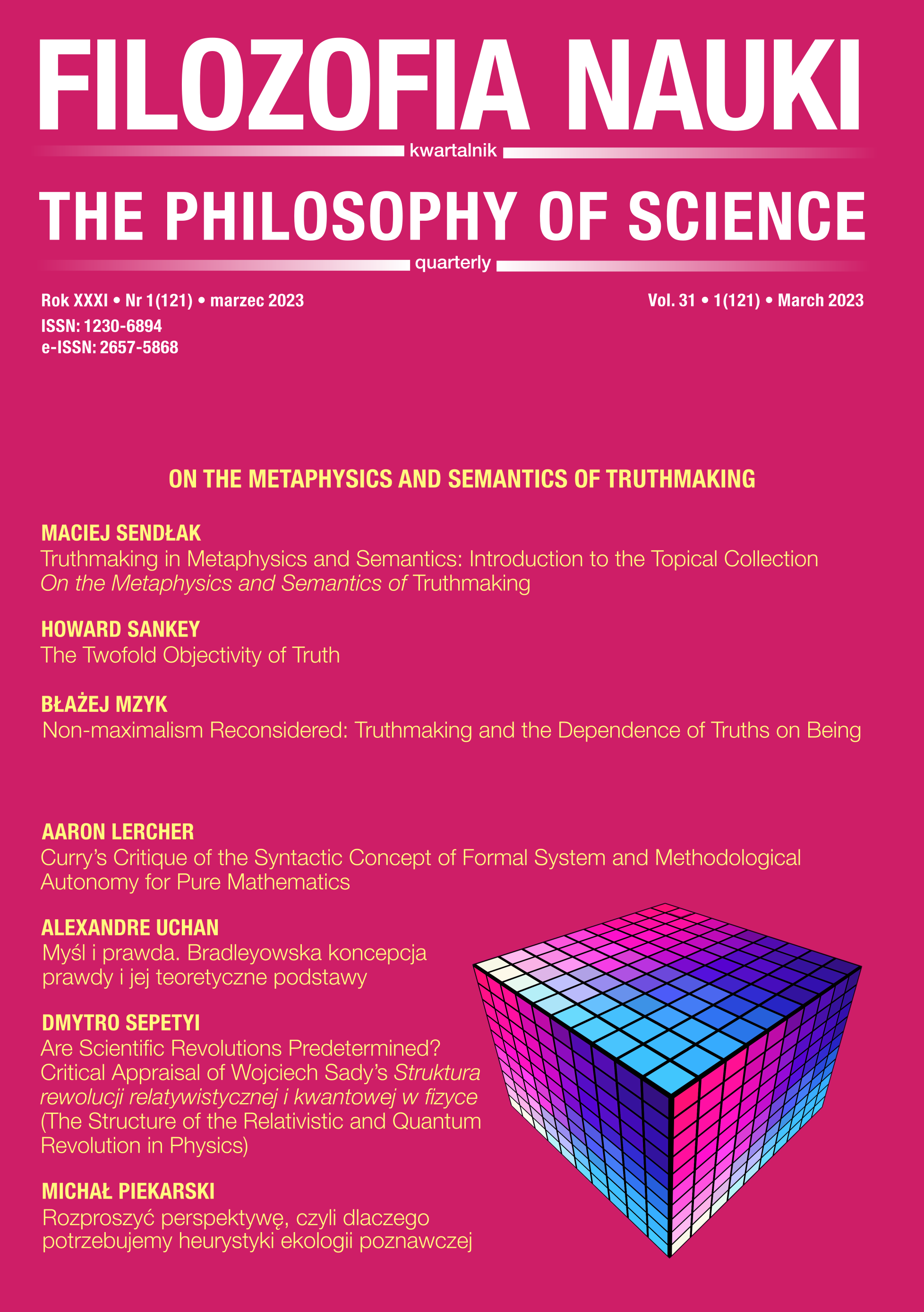Non-maximalism Reconsidered: Truthmaking and the Dependence of Truths on Being
DOI:
https://doi.org/10.14394/filnau.2023.0009Słowa kluczowe:
truthmaking, non-maximalism, deflationary truthmaking, dependence of truths on beingAbstrakt
Truthmaking non-maximalism usually assumes that some truths do not have truthmakers. I suggest, however, that non-maximalism can be understood more specifically, and that different types of non-maximalism can be distinguished. To do so, I refer to two positions. The first is deflationary truthmaking, some of whose proponents assume that no truths have truthmakers. The second distinguishes between truths that do not have truthmakers but depend on being, and truths that do not have truthmakers and moreover do not depend on being. Given the combinations of these positions, I propose a new classification indicating the positions available to a non-maximalist. I argue that one of these positions is particularly worth adopting because of its advantages over the other options.
Bibliografia
Armstrong D. M. (2004), Truth and Truthmakers, Cambridge: Cambridge University Press. https://doi.org/10.1017/CBO9780511487552
Asay J. (2018), “We Don’t Need No Explanation,” Philosophical Studies 175(4), 903–921. https://doi.org/10.1007/s11098-017-0898-1
Asay J. (2020), A Theory of Truthmaking, Cambridge: Cambridge University Press. https://doi.org/10.1017/9781108759465
Asay J. (2022), “The Best Thing About the Deflationary Theory of Truth,” Philosophical Studies 179(1), 109–131. https://doi.org/10.1007/s11098-021-01653-w
Asay J., Baron S. (2020), “Deflating Deflationary Truthmaking,” Philosophical Quarterly 70(278), 1–21. https://doi.org/10.1093/pq/pqz036
Audi P. (2020), “Why Truthmaking Is Not a Case of Grounding,” Philosophy and Phenomenological Research 101(3), 567–590. https://doi.org/10.1111/phpr.12605
Barker S., Jago M. (2012), “Being Positive About Negative Facts,” Philosophy and Phenomenological Research 85(1), 117–138. https://doi.org/10.1111/j.1933-1592.2010.00479.x
Baron S., Chua R. M., Miller K., Norton J. (2022), “Much Ado About Aboutness,” Inquiry (United Kingdom) 65(3), 298–326. https://doi.org/10.1080/0020174X.2019.1592705
Baron S., Miller K., Norton J. (2014), “Groundless Truth,” Inquiry 57(2), 175–195. https://doi.org/10.1080/0020174X.2013.855652
Betti A. (2015), Against Facts, Cambridge, Mass.: The MIT Press. https://doi.org/10.7551/mitpress/9780262029216.001.0001
Bigelow J. (1988), The Reality of Numbers: A Physicalist’s Philosophy of Mathematics, Oxford: Clarendon Press.
Cameron R. P. (2008), “Truthmakers, Realism, and Ontology,” Royal Institute of Philosophy Supplement 62, 107–128. https://doi.org/10.1017/S135824610800060X
Dodd J. (2002), “Is Truth Supervenient on Being?,” Proceedings of the Aristotelian Society 102(1), 69–85. https://doi.org/10.1111/j.0066-7372.2003.00043.x
Dodd J. (2007), “Negative Truths and Truthmaker Principles,” Synthese 156(2), 383–401. https://doi.org/10.1007/s11229-006-0007-z
Fox J. F. (1987), “Truthmaker,” Australasian Journal of Philosophy 65(2), 188–207. https://doi.org/10.1080/00048408712342871
Griffith A. M. (2015), “Towards a Pluralist Theory of Truthmaking,” Erkenntnis 80(6), 1157–1173. https://doi.org/10.1007/s10670-014-9717-7
Griffith A. M. (2022), “True by Default,” Journal of the American Philosophical Association 8(1), 92–109. https://doi.org/10.1017/apa.2020.42
Hornsby J. (2005), “Truth without Truthmaking Entities” [in:] Truthmakers, H. Beebee, J. Dodd (eds.), Oxford: Oxford University Press, 33–48. https://doi.org/10.1093/acprof:oso/9780199283569.003.0003
Jago M. (2012), “The Truthmaker Non-maximalist’s Dilemma,” Mind 121(484), 903–918. https://doi.org/10.1093/mind/fzs124
Jago M. (2019), “A Short Argument for Truthmaker Maximalism,” Analysis 80(1), 40–44. https://doi.org/10.1093/analys/anz064
Lewis D. (1992), “Critical Notice,” Australasian Journal of Philosophy 70(2), 211–224. https://doi.org/10.1080/00048409212345101
Lewis D. (2001), “Truthmaking and Difference-Making,” Noûs 35(4), 602–615. https://doi.org/10.1111/0029-4624.00354
Liggins D. (2012), “Truth-Makers and Dependence” [in:] Metaphysical Grounding: Understanding the Structure of Reality, F. Correia, B. Schnieder (eds.), Cambridge: Cambridge University Press, 254–271. https://doi.org/10.1017/CBO9781139149136.011
MacBride F. (2014), “How Truth Depends upon Being,” Analysis 74(3), 370–378.https://doi.org/10.1093/analys/anu057
McGrath M. (2003), “What the Deflationist May Say About Truthmaking,” Philosophy and Phenomenological Research 66(3), 666–688. https://doi.org/10.1111/j.1933-1592.2003.tb00283.x
Melia J. (2005), “Truthmaking without Truthmakers” [in:] Truthmakers, H. Beebee, J. Dodd (eds.), Oxford: Oxford University Press, 67–84. https://doi.org/10.1093/acprof:oso/9780199283569.003.0005
Mellor D. H. (2012), “Truthmakers for What?” [in:] Mind, Meaning, and Reality, Oxford: Oxford University Press, 96–112. https://doi.org/10.1093/acprof:oso/9780199645084.003.0008
Merricks T. (2007), Truth and Ontology, Oxford: Oxford University Press. https://doi.org/10.1093/acprof:oso/9780199205233.001.0001
Merricks T. (2011), “Replies,” Philosophy and Phenomenological Research 83(1), 212–233. https://doi.org/10.1111/j.1933-1592.2011.00513.x
Molnar G. (2000), “Truthmakers for Negative Truths,” Australasian Journal of Philosophy 78(1), 72–86. https://doi.org/10.1080/00048400012349361
Mulligan K., Simons P., Smith B. (1984), “Truth-Makers,” Philosophy and Phenomenological Research 44(3), 287–321. https://doi.org/10.2307/2107686
Perrine T. (2015), “Undermining Truthmaker Theory,” Synthese 192(1), 185–200. https://doi.org/10.1007/s11229-014-0558-3
Rami A. (2004), “Why the Minimalist Cannot Reduce Facts to True Propositions,” Metaphysica 5(1), 81–87.
Rami A. (2009), “Introduction: Truth and Truth-Making” [in:] Truth and Truth-Making, E. J. Lowe, A. Rami (eds.), Stockfield, UK: Acumen, 1–36.
Restall G. (1996), “Truthmakers, Entailment and Necessity,” Australasian Journal of Philosophy 74(2), 331–340. https://doi.org/10.1080/00048409612347331
Rodriguez-Pereyra G. (2005), “Why Truthmakers” [in:] Truthmakers, H. Beebee, J. Dodd (eds.), Oxford: Oxford University Press, 17–32. https://doi.org/10.1093/acprof:oso/9780199283569.003.0002
Russell B. (1918), “The Philosophy of Logical Atomism,” Monist 28(4), 495–527. https://doi.org/10.5840/monist19182843
Rychter P. (2014), “Truthmaker Theory without Truthmakers,” Ratio 27(3), 276–290. https://doi.org/10.1111/rati.12042
Schnieder B. (2006), “Truth-Making without Truth-Makers,” Synthese 152(1), 21–46. https://doi.org/10.1007/s11229-004-7905-8
Simons P. (2000), “Truth-Maker Optimalism,” Logique et Analyse 43(169/170), 17–41.
Simons P. (2005), “Negatives, Numbers, and Necessity: Some Worries about Armstrong’s Version of Truthmaking,” Australasian Journal of Philosophy 83(2), 253–261. https://doi.org/10.1080/00048400500111162
Simons P. (2010), “I—Peter Simons: Relations and Truthmaking,” Aristotelian Society Supplementary Volume 84(1), 199–213. https://doi.org/10.1111/j.1467-8349.2010.00192.x
Simpson M. (2014), “Defending Truthmaker Non-Maximalism,” Thought: A Journal of Philosophy 3(4), 288–291. https://doi.org/10.1002/tht3.144
Simpson M. (2021), “Deflationism and Truthmaking,” Synthese 198(4), 3157–3181. https://doi.org/10.1007/s11229-019-02273-y
Smith B., Simon J. (2007), “Truthmaker Explanations” [in:] Metaphysics and Truthmakers, J.-M. Monnoyer (ed.), Boston: De Gruyter, 79–98. https://doi.org/10.1515/9783110326918.79
Stamatiadis-Bréhier A. (2021), “Backing as Truthmaking,” Canadian Journal of Philosophy 51(5), 367–383. https://doi.org/10.1017/can.2021.31
Tałasiewicz M., Odrowąż-Sypniewska J., Wciórka W., Wilkin P. (2013), “Do We Need a New Theory of Truthmaking? Some Comments on Disjunction Thesis, Conjunction Thesis, Entailment Principle and Explanation,” Philosophical Studies 165(2), 591–604. https://doi.org/10.1007/s11098-012-9964-x
Tallant J. (2009), “Ontological Cheats Might Just Prosper,” Analysis 69(3), 422–430. https://doi.org/10.1093/analys/anp077
Tallant J. (2017), Truth and the World, New York: Routledge. https://doi.org/10.4324/9781315143491
Trueman R. (2021), “Truthmaking, Grounding and Fitch’s Paradox,” Analysis 81(2), 270–274. https://doi.org/10.1093/analys/anaa042
Vallicella W. F. (2000), “Three Conceptions of States of Affairs,” Noûs 34(2), 237–259. https://doi.org/10.1111/0029-4624.00209
Vision G. (2005), “Deflationary Truthmaking,” European Journal of Philosophy 13(3), 364–380. https://doi.org/10.1111/j.1468-0378.2005.00234.x
Williamson T. (2013), Modal Logic as Metaphysics, Oxford: Oxford University Press. https://doi.org/10.1093/acprof:oso/9780199552078.001.0001
Wittgenstein L. (1922), Tractatus Logico-Philosophicus, New York–London: Harcourt Brace & Company Inc. / K. Paul Trench Trubner & Co. Ltd.
Pobrania
Opublikowane
Jak cytować
Numer
Dział
Licencja
Prawa autorskie (c) 2023 Błażej Mzyk

Utwór dostępny jest na licencji Creative Commons Uznanie autorstwa – Użycie niekomercyjne – Bez utworów zależnych 4.0 Międzynarodowe.



















 Filozofia Nauki | ISSN 1230-6894 | e-ISSN 2657-5868
Filozofia Nauki | ISSN 1230-6894 | e-ISSN 2657-5868